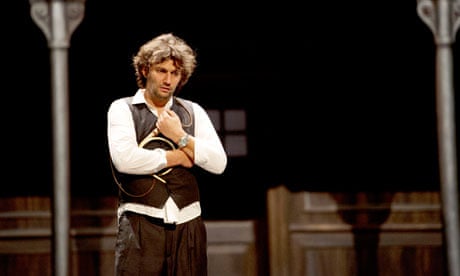La Scala's decision to stage Wagner's Lohengrin rather than an opera by Verdi for the gala opening of a season marking the bicentenaries of both composers caused a predictable local ballyhoo. But the glittering social rituals that always mark the Milan season opener went ahead undeterred. Italy's government may be tottering, but prime minister Mario Monti came to La Scala with several ministers. Imagine David Cameron taking time out from a political crisis to go to the opera with his cabinet. Italy has different priorities.
The perceived insult to Verdi has distracted attention from the significance of Milan's choice of Lohengrin rather than any other Wagner work. Once Wagner's most popular opera, including in Italy, Lohengrin then became his most widely despised. Now there is a fresh and overdue attempt to understand Lohengrin taking place, and Daniel Barenboim's championing of it at the Scala is a significant milestone in that reevaluation of a work that stands on the cusp between grand opera and Wagnerian progressivism.
Claus Guth's strikingly staged production is set in an enclosed 19th century courtyard. It starts as though it might succeed in unlocking the story of the mysterious swan-knight who rescues Elsa of Brabant when she is accused of murdering her brother, before abandoning her when she insists on knowing his identity. In Guth's conception, Elsa is always the pivotal character of the opera, a disturbed visionary who clings to memory (her murdered brother is often on the stage), music (represented by an on-stage piano) and the earth (embodied by trees, reeds and water) as protection against the bourgeois political order imposed by the usurper Duke Telramund and his wife Ortrud, who literally wears the trousers in this marriage.
But Guth's conception loses direction as the opera evolves. That's partly because Wagner made Ortrud an outsider while Guth makes her an insider, a self-harming maiden in uniform, But the main reason is that Guth cannot explain why Lohengrin behaves as he does. Having arrived as a figment of Elsa's delirium - she almost literally gives birth to him - his rejection of Elsa is made to seem callously meaningless. It's a very fascinating try, but in the end Guth's ideas run out of steam.
Given Elsa's centrality to this staging, it was bad luck that flu removed both the much anticipated Anja Harteros and her replacement Ann Petersen from proceedings. In the circumstances, Bayreuth's current Elsa, Annette Dasch, coped heroically with a production that she joined with less than 24 hours' notice, though her soprano lacked the body and projection that the Scala's big stage demands.
In the title role, Jonas Kaufmann was in a class of his own, totally involved and giving a masterclass of daringly varied, sometimes mannered, vocal technique. Evelyn Herlitzius was a tireless but not a classic Ortrud, Tómas Tómasson a very credible Telramund and René Pape a luxury though occasionally strained King Heinrich. Barenboim's grip over the score was not always consistent, especially towards the end of act two, but when it was good it was very good indeed and the La Scala orchestra and chorus played and sang fabulously well for him.

Comments (…)
Sign in or create your Guardian account to join the discussion